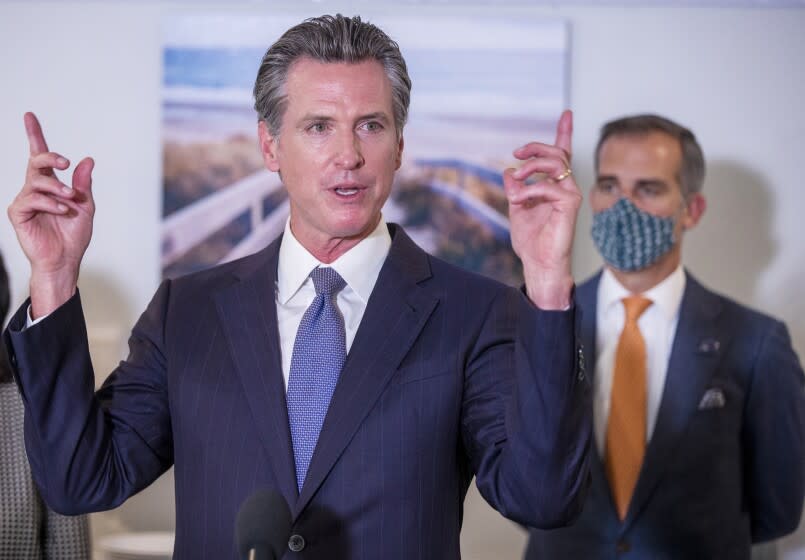Newsom administration draws fire over no-bid Kaiser Permanente contract

California would hand Kaiser Permanente a no-bid statewide contract to serve Medi-Cal enrollees under a deal struck behind closed doors by Gov. Gavin Newsom's administration, raising questions among other healthcare plans about the preferential treatment of a generous supporter of the governor.
The secrecy of the special accommodation for Kaiser outraged other providers, some of which are in the middle of a public bidding process as the state overhauls its healthcare program that serves nearly 14 million low-income residents. Meanwhile, local health plans say the contract will allow Kaiser to cherry-pick healthier enrollees, leaving other care providers to cover a higher percentage of the state's sickest and most costly patients.
The Newsom administration said it will seek authority from the Legislature to approve the contract, which has yet to be made public.
“This prioritizes the interests of big businesses over the interests of the safety net Medi-Cal delivery system, that exists only to serve the underserved, is held accountable only to the public and which continuously works to improve the Medi-Cal delivery system because it is the right thing to do — and no other motivation," said Linnea Koopmans, chief executive of Local Health Plans of California, which represents 16 local health plans that serve more than 70% of Californians enrolled in Medi-Cal managed care.
State officials attempted Friday to tamp down on claims that Kaiser is receiving a "sweetheart deal," as reported Thursday by Kaiser Health News, saying the healthcare company would be subject to the same terms as other plans required to go through the bidding process. However, Kaiser will maintain several provisions that allow the plan to exclude most Medi-Cal enrollees. For example, Kaiser generally does not accept new Medi-Cal enrollees unless the person has a recent history with the insurer or a family member with coverage.
In the new agreement, Kaiser would continue to limit which Medi-Cal enrollees are accepted, while also offering coverage to youth in foster care and those eligible for Medicare.
"If you have a situation where you are able to pick and choose the members who are healthier, it puts an added strain on the safety net public system," said Jarrod McNaughton, chief executive of the Inland Empire Health Plan. "It's a lot easier to have higher-quality scores for a healthier population than for those most in need. That disparity is what concerns us."
Kaiser, which serves 9 million Californians, has built a formidable political presence in the state Capitol, routinely giving millions to politicians and their causes. Last year, Newsom tapped Kaiser to assist the state's vaccine program. In 2020, Kaiser was the top donor of behested payments to Newsom, giving $35.5 million in charitable donations on behalf of the governor.
Michelle Baass, director of the state Department of Health Care Services, which oversees Medi-Cal, said the contract with Kaiser is part of a larger effort by the state to rework its healthcare program and improve health quality and equity. Since Kaiser is both an insurer and a healthcare provider, Baass said its system is limited in how many patients it can serve and where it can physically care for enrollees. That complicated Kaiser's ability to be part of the formal bidding process with other plans, Baass said.
Without creating a separate avenue for Kaiser, state officials said they risked losing its highest-quality plan, which would affect 900,000 Medi-Cal enrollees who are currently with Kaiser. Under the new deal, Kaiser would commit to growing new Medi-Cal enrollment by 25% over the five-year contract in 32 counties where it currently operates.
"The proposal recognizes that they have a unique structure and because of that we are proposing to enter into this direct contracting relationship," Baass said.
Dr. Bechara Choucair, chief health officer at Kaiser, said the new contract will allow the healthcare company to offer quality care to more people who rely on the state's safety net system.
"The goal is not for Kaiser Permanente to compete with the safety net, but to support it," Choucair said. "We are not competing with other Medi-Cal plans for members, nor are we seeking to turn a profit off Medi-Cal enrollment. Kaiser Permanente participates in Medi-Cal because it is part of our nonprofit mission to improve the health of the communities we serve."
The change, however, means local health plans would lose hundreds of thousands of enrollees that Kaiser was caring for through subcontracts with the local plans. With the local health plans cut out, they stand to lose millions of dollars.
For the Inland Empire Health Plan, the Kaiser contract could mean the loss of 144,000 Medi-Cal enrollees in Riverside and San Bernardino counties. That translates to a loss of $9 million to $10 million a year to the Inland Empire plan for community supports not offered by the commercial plan and for administrative fees, McNaughton said.
Critics have questioned why the state would offer the expanded contract to serve California's neediest residents to Kaiser given the healthcare company has long faced criticism — and state sanctions and fines — for its mental health care.
Anthony Wright, executive director of the advocacy group Health Access California, said the contract would allow the state more oversight of Kaiser, which he said is "a step in the right direction."
"As much as Kaiser does well on many quality metrics, it can and should do better," Wright said. "The arrangement between [the state] and Kaiser should include requirements to maintain or improve Kaiser’s record on quality and equity as they take on more of this vulnerable population, especially given their spotty record on behavioral health."
This story originally appeared in Los Angeles Times.
